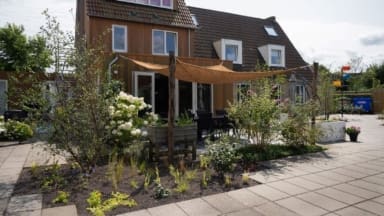
The “Tuinflippen” and “Tegelwippen” campaigns, fronted by Dutch tv- gardener, presenter and garden designer, Lodewijk Hoekstra aims to encourage residents to reduce paving for a more sustainable garden. By means of the campaign, the Dutch population are being encouraged to ‘flip their gardens’ from paved to green, and thereby being made aware of more sustainable options for a ‘greener’ garden.
Since 2021, Dutch towns compete in a national ‘tegelwippen’ competition – which literally translates as ’tile flipping’, where residents compete to remove as many paving slabs as possible to green gardens and public spaces. Reportedly, over eleven million tiles have been removed since the competition started, equivalent to 200 football pitches of newly planted green spaces. Removed tiles are collected by the local councils and the winning town receives, the much publicised golden spade award.
To demonstrate that sustainable options are feasible – even on a low budget, Hoekstra and his team are also flipping (converting) a series of (fully) paved ‘gardens’ from stark, hard surface dominated spaces to greener outdoor spaces, incorporating herbaceous beds and where needed, opting for permeable paving.
The competition’s Creative Director, Eva Braaksma of creative agency Frank Lee, admits that the competition is a bit of a “gimmick”, but participation shows impressive national coverage and any action to reduce the wave of front and back gardens that are being paved over, is commendable and very relevant.
In the UK for example, the results of the 2023 EO poll worryingly indicated that nearly half (49%) of UK homeowners were considering paving over their front gardens (to accommodate an EV). The HTA’s October 2022 survey revealed that 19% of UK consumers with a private garden intended to pave over at least some of it in the next 5 years, putting an estimated 3-7% of total UK domestic garden area at risk. The RHS Greening Grey Britain surveys conducted in 2005 and 2015 revealed that three times as many front gardens are now paved over compared to ten years ago, a total increase of 15 square miles of ‘grey’, and that plant cover in front gardens has decreased by as much as 15%. Over five million front gardens now have no plants growing in them (that’s one in three for the UK) and four and a half million front gardens (one in four) are completely paved over.
With the weather changing, we will see increased heavy rain showers, coupled with long periods of heat and drought. Hard surfaces contribute to flooding and increases local temperatures as paving, tarmac and concrete increase the amount of rainwater that runs off by as much as 50 percent. This additional water usually flows into street drains, which can’t always cope and the excess of which is washed back up people’s front drives and flooding homes. To avoid this problem, the advice is clear – keep hard surfaces to a minimum and use permeable materials as much as possible.
Or as the Dutch say, flip them for green…

